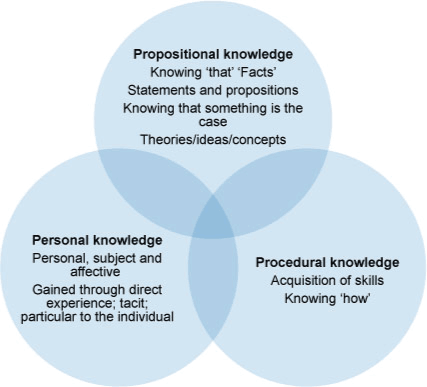1 Knowledge
Knowledge is fundamental to teaching and learning. However, when people speak of ‘knowledge’, what do they mean by the term? Is there a shared understanding of the concept?
It can be helpful to think in terms of different types of knowledge. From a philosophical perspective, knowledge is typically divided into three categories:
- personal knowledge
- procedural knowledge
- propositional (declarative) knowledge.
Personal knowledge
Personal knowledge can be thought of as ‘knowledge by acquaintance’ – the kind of knowledge someone claims to have when they say things like ‘I know Beethoven’s music’ or ‘I know Mrs Smith’. The importance of personal knowledge has been promoted through the concepts of ‘critical thinking’ and ‘critical pedagogy’, whereby knowledge is conceived of as not fixed and ‘given’ but as something that is personally constructed through the process of the learners’ active interaction with their world and with those who teach them. Personal knowledge has tended to be undervalued in formal educational contexts, as it is individual and tacit – and therefore not easily open to ‘packaging’ as curriculum content or to being assessed. However, the value that a teacher attaches to personal knowledge will impact on how they teach.
Procedural knowledge
Procedural knowledge can be thought of as knowledge of how to do something – the practical skills of being able to ride a bike, kick a football or mend a leaking pipe, for instance. People who possess procedural knowledge are not necessarily claiming that they understand the theory that lies behind the activities they undertake but that they possess the skills to enable them to do these things.
Propositional knowledge
Propositional knowledge is sometimes caricatured as being simply about the acquisition (through memorisation) of isolated facts, such as the date of the Battle of Hastings or that the angles of a triangle add up to 180 degrees. However, a higher order of propositional knowledge is ‘conceptual knowledge’. This is demonstrated through an understanding of the interrelationship between ‘facts’ within a larger framework. These frameworks might, for example, be scientific or mathematical theories, the rules of Western musical harmony or the syntactical rules of a particular language.
It is important to remember that these categorisations are underpinned by ideological and value judgements about what is important knowledge. They provide a way of thinking about knowledge rather than a detailed description of a reality. It is also important to note that they rarely exist independently of each other. For example, in order to have personal knowledge of someone, you need to possess some propositional knowledge about them. The relationship between the three different types of knowledge is outlined in Figure 1 below.
Activity 1 Considering different types of knowledge
For each type of knowledge, identify some examples from your subject. Do not restrict your thinking to the way in which your subject presents itself in school but also consider how your subject is presented in the wider world.
Also think back to the experiences of your subject that you had as a student.
- Do you think one category of subject knowledge had a higher status than another? If so, why do you think this might have been?
- Did an emphasis on specific kinds of knowledge lead to particular approaches to teaching?

